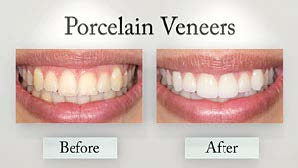Dental veneers are a miracle of modern dentistry that can transform smiles in remarkable ways. These thin, custom-made shells are designed to cover the front surface of teeth, improving their appearance dramatically. Whether you’re looking to fix discoloration, chips, or gaps, veneers offer a solution that is both effective and aesthetically pleasing.
The process begins with a consultation at a dentist’s office, where your dental goals and the steps to achieve them are discussed. Veneers can be made from various materials, each offering benefits such as durability and a natural look. The choice between materials like porcelain and composite resin will depend on your specific needs and the advice of your dentist.
Embracing dental veneers means not just a new smile but a boost in confidence. The transformation they offer goes beyond the cosmetic, touching on aspects of personal and social life. With proper care, this investment in your smile can bring joy and self-assurance for years to come.
Beginning Your Journey with Dental Veneers
Embarking on the journey to a transformed smile with dental veneers starts with a simple step: booking a consultation. This initial discussion sets the foundation for what’s ahead.
Understanding What Dental Veneers Are
Dental veneers are like a magic wand for your smile. They are thin pieces that cover the front of your teeth, making them look amazing. Think of them as a fresh coat of paint for your car, but for your teeth. They help fix issues like stains, chips, and gaps, making your smile bright and even.
The Dental Veneer Procedure: A Step-by-Step Guide
The first step in getting dental veneers is talking to your dentist in Markham. This chat helps you understand what to expect and lets your dentist know how you want your smile to look. It’s like planning a makeover for your teeth.

Preparing for Your Veneer Placement
Getting ready for veneers begins with an initial appointment where your dentist will examine your teeth and gums. This check-up makes sure your mouth is healthy and ready for veneers. It’s an important step to ensure that your veneer journey starts on the right foot.
During Veneer Placement: What to Expect
At your initial appointment, expect a thorough examination of your teeth and gums by your dentist. This ensures that your mouth is in good health and ready for the veneer placement. It’s a crucial part of the process, preparing your smile for its transformation.
Types of Veneers and How to Choose
Choosing the right type of veneers is key to achieving your dream smile. With options like pop-on veneers that cover your natural teeth to hide any issues, the selection process is crucial. Let’s explore how to make the best choice for your smile.
Exploring the Main Types of Veneers
There are many types of veneers to choose from, including traditional porcelain veneers, removable veneers, and more. Each type has its own benefits, like how traditional porcelain veneers can last a long time and look very natural. Removable veneers offer flexibility since you can take them out. It’s important to consider what’s best for your smile.
Porcelain Veneers: The Durable Beauty
Porcelain veneers stand out for their strength and natural appearance. They’re like a durable, beautiful new surface for your teeth, designed to last for many years with the right care. If you’re looking for a long-term solution to enhance your smile, porcelain veneers could be the perfect choice.
Composite Resin Veneers: The Quick Fix
Composite resin veneers are a fantastic option for those looking for a quick and effective way to improve their smile. Made from a durable composite material, these veneers can be applied faster than their porcelain counterparts, offering a beautiful result in less time.
No-Prep Veneers: The Less Invasive Option
For those seeking a less invasive option, no-prep veneers are an excellent choice. Unlike traditional porcelain veneers, no-prep veneers require minimal to no enamel removal. This makes the process simpler and preserves more of your natural tooth, all while achieving a beautiful smile transformation.
Advantages and Considerations
Dental veneers offer a host of benefits, from enhancing your smile to improving tooth durability. However, it’s important to weigh these advantages against potential considerations, ensuring the choice aligns with your lifestyle and dental health goals.
The Advantages of Dental Veneers Procedure
Veneers can change your smile for the better in many ways. They’re like thin shells that go over discoloured teeth, making them look white and bright. Plus, they can last between 10 to 15 years with the right care, offering a long-term solution for a beautiful smile.
Weighing the Risks: Potential Disadvantages
While veneers have many benefits, there are some things to think about. For example, they can last a long time, around 10 to 15 years, but you need to take good care of them. It’s important to know all sides before deciding.
Are Veneers Permanent? Understanding Longevity and Care
Veneers can be a long-lasting solution for your smile, often staying in good shape for 10 to 15 years with proper care. Avoiding hard foods and drinks that can cause damage, and visiting your dentist regularly for check-ups, are key to maintaining your veneers. This way, you can enjoy a beautiful smile for many years.
Do Dental Veneers Require Special Care? Tips for Maintenance
Dental veneers do need some special care to keep them looking great. To maintain your veneers, avoid biting into very hard or crunchy foods. Also, certain foods and drinks, like coffee or red wine, can stain your veneers, so it’s best to consume them in moderation. Brushing and flossing regularly are key to keeping your veneers in top shape. Plus, visiting your dentist regularly for check-ups can help catch any issues early on.
Financial Insights
The cost of dental veneers can vary widely depending on several factors. The type of veneers you choose, the condition of your teeth, and the fees of the dental laboratory are all important to consider. While it’s tempting to go for the cheapest option, remember that the quality and durability of your veneers are crucial for their long-term value. Consulting with a reputable dentist will provide you with a clear and accurate quote for your specific case.
Navigating the Costs: How Much Do Veneers Cost?
The price tag of dental veneers can be a significant consideration for many of us. The cost is influenced by the type of veneers, the complexity of your dental needs, and additional fees such as those for the dental lab. To get a realistic estimate of what your veneers might cost, it’s best to speak directly with a dentist. Investing in veneers is a long-term commitment to your smile, so understanding the costs upfront is essential.
Insurance Coverage and Veneers: What You Need to Know
When it comes to veneers, understanding what your insurance covers is crucial. Generally, dental insurance may not cover veneers as they are considered cosmetic treatments. However, it’s important to review your policy or speak with your insurance provider, as coverage can vary. Also, it’s essential to address any oral health issues, like gum disease, before considering veneers. Prioritizing your oral health ensures that your investment in the appearance of your smile is well protected.
Making the Right Choice
Choosing between dental veneers, crowns, or implants can feel overwhelming. Each option serves different needs. Dental veneers are a cosmetic choice that can dramatically improve the appearance of your smile without invasive procedures. They’re ideal for those looking to correct cosmetic issues and desire an aesthetically pleasing look. Discussing your options with a dentist can help you make the best decision based on your unique dental needs and cosmetic goals.
Veneers vs Crowns vs Implants: Finding What’s Best for You
Determining whether to choose dental veneers, crowns, or implants depends on your specific dental needs. Veneers are perfect for enhancing the appearance of your smile by covering the front surface of a tooth. Dental crowns, however, cover the entire tooth and are used to restore teeth that are badly damaged. Your decision should consider factors like the extent of tooth damage, cosmetic goals, and budget. A consultation with your dentist can provide clarity and guide you towards the best solution for your smile.
Who Needs Dental Veneers? Are You a Candidate?
If you’re considering dental veneers, it’s likely because you’re looking to correct cosmetic issues and achieve an aesthetically pleasing smile. Veneers are ideal for those who have minor cosmetic flaws, such as chips, gaps, or discolorations that teeth whitening can’t fix.
However, it’s important to have healthy teeth and gums before proceeding with veneers. A consultation with a dentist can determine if veneers are the right choice for you, ensuring you’re on the path to the smile you’ve always wanted.
Aftercare and Recovery
After getting veneers, proper care is essential to ensure they last for many years. Brushing at least twice a day with a nonabrasive toothpaste and using a soft-bristled toothbrush are key to maintaining your veneers. Flossing daily and using an antibacterial mouthwash can also help in keeping your veneers in pristine condition. Remember, using your teeth as tools can damage your veneers, so it’s best to avoid such habits. Regular visits to your dentist for exams and cleanings will also help in maintaining the health and appearance of your veneers.
Keeping Your Veneers in Pristine Condition
Maintaining your veneers involves a few simple but important steps. Brushing twice daily with a nonabrasive fluoride toothpaste and a soft-bristled toothbrush, along with flossing daily, will keep your veneers looking their best. It’s also advisable to use an antibacterial mouthwash twice a day to help protect against plaque buildup. Avoid using your teeth as tools, which can cause damage to your veneers. Lastly, regular dental check-ups are essential for ensuring your veneers and overall oral health are in top condition.
Frequently Asked Questions
How Long Do Dental Veneers Last?
The lifespan of dental veneers can vary, generally lasting between 5 to 15 years, depending on the type of veneers and how well they are cared for. Practicing good oral hygiene, including brushing and flossing daily, is crucial for extending the life of your veneers. Regular visits to your dentist are also important for maintaining the condition of your veneers. Avoiding habits that could damage your veneers, like teeth grinding, will help ensure they remain in excellent condition for as long as possible.
Are There Any Alternatives to Dental Veneers?
While dental veneers are a popular choice for improving the appearance of your teeth, there are several alternatives to consider. Tooth whitening can brighten your smile, and bonding with composite resin material can address chips or cracks. For those looking for more permanent solutions, dental implants can replace missing teeth. Each option has its own benefits and considerations, including cost, durability, and the extent of dental work required. Considering your specific needs and discussing options with your dentist can help you find the best solution to enhance your smile and confidence.
Final Thoughts on Transforming Your Smile with Veneers
Dental veneers are a powerful way to enhance your smile and boost your confidence. Whether you’re dealing with teeth whitening challenges, gaps between teeth, or cosmetic concerns like a chipped tooth, veneers offer a versatile solution. Utilizing high-quality dental materials, they align with your natural tooth structure to create a seamless, radiant smile. The process of veneer placement is designed to address a myriad of cosmetic imperfections, offering a smile makeover that feels both natural and transformative.
Choosing dental veneers can be a life-changing decision. Not only do they provide a solution for tooth discoloration and cosmetic imperfections, but they also promote a positive self-image. With options ranging from porcelain to tooth-colored composite resin, veneers are tailored to meet individual needs and preferences. As we close our discussion on veneers, remember that this investment in your smile is also an investment in yourself, paving the way for a brighter, more confident future.


